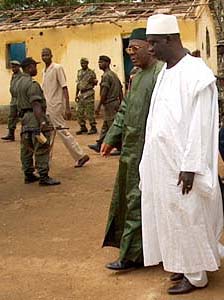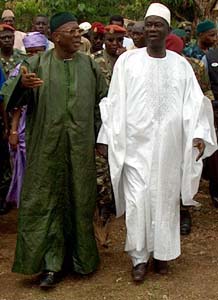Sierra Leonean and Guinean Presidents Meet at Border Town
Peter C. Andersen
3 June 2001 - Pamelap, Guinea
Sierra Leone Web
President Ahmad Tejan Kabbah and Guinean President Lansana Conteh clasped
hands Sunday amid the rubble of what  until recently was the thriving border town
of Pamelap, in a meeting to designed to underscore the recent dramatic
improvement in the security situation in northern Sierra Leone.
until recently was the thriving border town
of Pamelap, in a meeting to designed to underscore the recent dramatic
improvement in the security situation in northern Sierra Leone.
The encounter between the two heads of state came midway through a whirlwind tour by President Kabbah of his native Kambia District, long a rebel stronghold, only days after RUF forces in the area finished handing their weapons over to United Nations peacekeepers.
As representatives of the Sierra Leonean and Guinean governments worked under the shade of a baffa to agree on the final text of a communiqué drafted earlier in Freetown, a source close to the presidency stressed that the meeting, aside from its symbolic significance, could be seen as a signal to Kambia District residents that it was now safe for them to return to their homes.
Kabbah’s first stop Sunday morning was the village of Kukuna, where he received a jubilant welcome from a crowd which appeared to number several thousand. Townspeople chanted, sang, and shook hands enthusiastically with members of the presidential entourage – even reporters – as they waited for Kabbah to arrive by helicopter from Freetown. When the Diamond Airways chopper touched down and the president emerged, young and old linked arms behind him and the singing reached a near-deafening level.
But Kabbah had come to Kambia District to deliver the message that, with the
war at an end, it was now time for reconciliation. "E don be, e don be,"
-- what’s done is done -- he told them. "What we are asking is, your
brothers your sisters who went away and who have come back, embrace them if they
apologise to you." It was a message he was to repeat at each stop along the
way – at Kambia, Mange and Rokupr, and finally at his birthplace of Mambolo.
"Forgive them," he implored the people. "Forgive them."
reconciliation. "E don be, e don be,"
-- what’s done is done -- he told them. "What we are asking is, your
brothers your sisters who went away and who have come back, embrace them if they
apologise to you." It was a message he was to repeat at each stop along the
way – at Kambia, Mange and Rokupr, and finally at his birthplace of Mambolo.
"Forgive them," he implored the people. "Forgive them."
Kakuna elders told Kabbah of rebel attacks, but the town bears few outward scars of Sierra Leone’s ten-year civil war. The same was not true of towns closer to Pamelap. Roof panels had been carried away by rebel attackers, leaving houses open to the rains and uninhabitable. Many of the mud-brick structures had simply collapsed, mixing clay with those spilled contents which had not simply been carted off.
At Pamelap itself, no intact buildings were visible. The civilians there were fewer in number – a few hundred rather than thousands -- and their response to the sight of two presidents and accompanied by an overwhelming force of security personnel was somewhat muted. There were few children among the crowd, and few older people, leading some reporters to speculate that they might have been bused in for the ceremony.
Once back on the Sierra Leonean side of the border, enthusiasm returned. People in small villages along the road waved, danced and swirled brightly-coloured cloths as the presidential convoy passed by. As the presidential helicopter lifted off from Mambolo, children seven rows deep stood to stare at a reporter. Finally an old man asked, "What did you bring for me?" "What did you keep for me?," the reporter asked. "Peace," the old man replied. "I kept peace."
